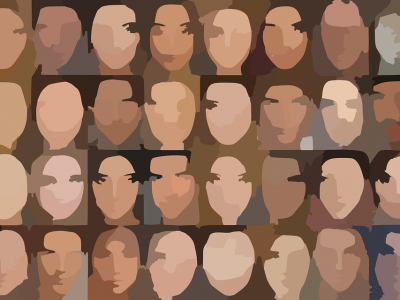
Thousands honor blogger Ahmed Rajib Haidar, who was killed last month in Dhaka. Image by Firoz Ahmed. Copyright Demotix (16/2/2013)
Most of this report was researched, written, and edited by Lisa Ferguson, Weiping Li, Alex Laverty, Hisham Almiraat and Sarah Myers.
Global Voices Advocacy's Netizen Report offers an international snapshot of challenges, victories, and emerging trends in Internet rights around the world. This week, we begin with Bangladesh, where authorities are targeting bloggers accused of “anti-Muslim” writings. We then look at cases of netizens in Vietnam, Egypt, and Kuwait, all of whom are facing government threats for political expression online.
Thuggery
In Bangladesh, government authorities have taken a series of actions against local bloggers associated with political protests in Shahbag Square. The Home Ministry has formed a nine-member committee to “track bloggers and Facebook users who made derogatory remarks about Islam and the Prophet Muhammad.” A group of Muslim clerics submitted a list of 84 bloggers [bn] to the committee, accusing the bloggers of atheism and criticizing Islam. Since then, three bloggers – Rasel Parvez, Mashiur Rahman Biplob, and Subrata Adhikari Shuvo – have been detained for their “alleged write-ups demeaning Islam and the Prophet Muhammad.” Award-winning blogger Asif Mohiuddin, a self-proclaimed atheist, was detained this morning. Somewhereinblog.net [bn], parent site for many of the blogs in question, complied with a request from the Telecommunication Regulatory Commission to take down four blogs related to the controversy.
Bangladesh is a non-religious parliamentary democracy that protects the right to free expression in its constitution. If a person claims to be an atheist, he or she has the same rights as other citizens. However, under Section 295A of Bangladesh's Penal Code (1860), any person who has a “deliberate” or “malicious” intention of “hurting religious sentiments” can be subject to imprisonment.
The Kuwait Society for Human Rights reports that a Kuwaiti Twitter user has been sentenced to two years in jail for “insulting the country’s emir.”
The blog Anh Ba Sam, described by Asia Sentinel as Vietnam’s “leading source of alternative news,” has been hacked repeatedly over the past few weeks, with hackers deleting articles, compromising the e-mail accounts of the blog’s editorial team, and posting a letter attributed to the blog’s managing editor on the website. While critical of the regime, the blog’s first priority “has been to publish an objective summary of newsworthy events in and about Vietnam” according to retired US diplomat David Brown.
An arrest warrant was issued for Egyptian blogger Alaa Abd El Fattah for “inciting aggression” against members of the Muslim Brotherhood and for a mention he received from another Twitter user, known as Princess Joumana. The investigation has received widespread criticism from the netizen community, because of its focus on comments posted by others rather than the actions of El Fattah.
Censorship
A Saudi English-language newspaper reported that Saudi authorities plan to limit access to Twitter to those who have registered their national identification documents on the site, thus barring Saudi citizens from using Twitter anonymously.
Officials at Egypt’s National Telecommunications Regulatory Authority said Internet service providers in Egypt are prepared to block pornographic content at the request of judicial authorities. Filters have been installed on ISP networks since January, but the Authority has requested that a judge specifically identify which websites should be blocked rather than agreeing to block pornographic sites on the whole.
Surveillance
The Saudi Communications and Information Technology Commission (CITC) has asked online and mobile communication companies such as Skype and WhatsApp to monitor their customers’ communications in the interest of security. Saudi authorities said they will “consider” blocking the services if those companies choose not to cooperate.
Privacy
A new study on anonymized phone location data, published in Nature, found that with just four data points of location, researchers could accurately identify 95 percent of the supposedly anonymous users in their sample. The “uniqueness of human mobility” meant that the researchers from MIT and Belgium could use carrier-collected data to circumvent the layer of privacy that anonymity is meant to guarantee the user.
National Policy
Canada’s Supreme Court ruled that law enforcement authorities cannot force telecommunications companies to hand over email and text message content with an easy-to-obtain general warrant; the court ruled that they must instead secure judicial wiretap authorization, which is typically granted only for the investigation of serious crimes. Telus Communications Corporation, which sought to contest a request for SMS content from Ontario police, argued that laws written years ago were never intended to be applied to future forms of communication like SMS messaging.
Only a month after announcing it would allow foreign tourists to use a new 3G mobile Internet network called Koryolink from their own cellphones, North Korea has terminated Internet access for visitors. However, Koryo Tours says that visitors to North Korea will still be able to purchase prepaid SIM cards for international calling. There is speculation that the 3G service may have been terminated after North Korean officials decided they did not like some of the content that journalists had posted using the new service.
Copyright
South Korean National Assembly member Choi Jae-Cheon announced a plan to repeal the “three-strikes” copyright policy in South Korea. Passed in 2009, the law authorizes the government to issue notices to Internet users who violate copyright restrictions online. If the users continue to violate copyright policies after receiving three warnings from the the Ministry of Culture, Sports, and Tourism, their web accounts can be shut down without a court order. Opponents of the policy argue that it not only violates due process but that the punishment is disproportionately grave in comparison to the crime.
Sovereigns of Cyberspace
Portuguese media companies are demanding that Google pay for content on publishing links to articles and article leads in its Google News search engine.
A US court dismissed a lawsuit brought by Chinese pro-democracy activists against Chinese search engine giant Baidu and the People’s Republic of China. The plaintiffs in Zhang et al v. Baidu.com alleged that Baidu had violated their First Amendment rights under the US Constitution, repressing their freedom of speech by censoring content they had posted. The decision to dismiss the case, on the grounds that the defendants were not properly served with court papers, came after China claimed the case infringed on its sovereignty and the court determined it lacked jurisdiction over the case.
Cybersecurity
The Election Commission of Pakistan (ECP), an independent body tasked with supervising the upcoming general election this May, had its website defaced on March 29, 2013. According to local media, an “[Indian hacker] defaced the home page and has possibly compromised its availability to visitors.”
Widespread lags on the Internet worldwide are the result of a online brawl between a Dutch web host, Cyberbunker, and Spamhaus, a spam-fighting group based in Geneva. Cyberbunker is retaliating against its position on a Spamhaus blacklist through distributed denial of service (DDoS) attacks. Collateral damage from the attacks took out critical infrastructure on the London Internet Exchange. The New York Times offers an infographic of the largest of these DDoS attacks here.
Cyberattacks intended to steal information have become increasingly destructive in the past month, with attacks on American Express, JP Morgan, and 32,000 computers in South Korea’s bank and television firms. This has led US corporations to be more willing to seek government regulation and action in the area of cyberdefense as the attacks become more erratic and damaging.
US government agencies will soon be required to carry out formal “cyber-espionage or sabotage risk” assessments before purchasing information technology systems from entities “owned, directed, or subsidized by the People’s Republic of China.” The sanctions are likely in response to growing concerns about the recent Chinese cyber-attacks on American companies.
Netizen Activism
Advocates in Pakistan are going to court to challenge the country's ban on YouTube. The NGO Bytes for All in conjunction with the Media Legal Defence Initiative has requested the UN Special Rapporteur on Freedom of Expression intervene, arguing website blocking “constitutes a serious violation of the Pakistani electorate’s right to seek and receive information.”
European Digital Rights (EDRi), a leading network of digital rights defenders in Europe, has called for bloggers not to be considered liable “for third-party comments on their posts in cases when they have not specifically intervened in the content at issue.” EDRi members are currently defending a Polish municipal councillor at the European Court of Human Rights. The defendant was sued for defamatory comments attached to one of his blog posts.
Publications and Studies
-
Mapping Digital Media: India – Open Society Foundations
Subscribe to the Netizen Report by email
For upcoming events related to the future of citizen rights in the digital age, see the Global Voices Events Calendar.




2 comments
Went through the article which is research based, I am gonna add some thing here about the banning blogs in Bangladesh. Bangladesh was east Pakistan before 1971 and they faced the brutalities, barbarism of Pakistan Army state establishment. During the Bangladeshi liberation movement 3 million of the Bengali people were killed by the so called Islamist militias titled as Al-Badar and Al-Shams which were the affiliated and sub ordinate militant wings of current Jumat e Islami in west [current Pakistan] and east Pakistan [current Bangladesh] backed by the Pakistani Army. Bangladesh alike other underdeveloped states couldn’t arrest the blacklisted leaders. They were having hard shells of masses around them. After three decade of war, Bangladeshi democratic government and liberal secular parties have mandate to punish the Jumat e Islami leadership involved in the civil war against their own people. They have already outlawed the hardliner religious intelligentsia and literature. Now, to veil the very serious issue some of the rightest groups are spoiling the pool. That’s why poor bloggers are picked up and their blogs are shut downed. It seems an engineered plan aimed to gain public support.